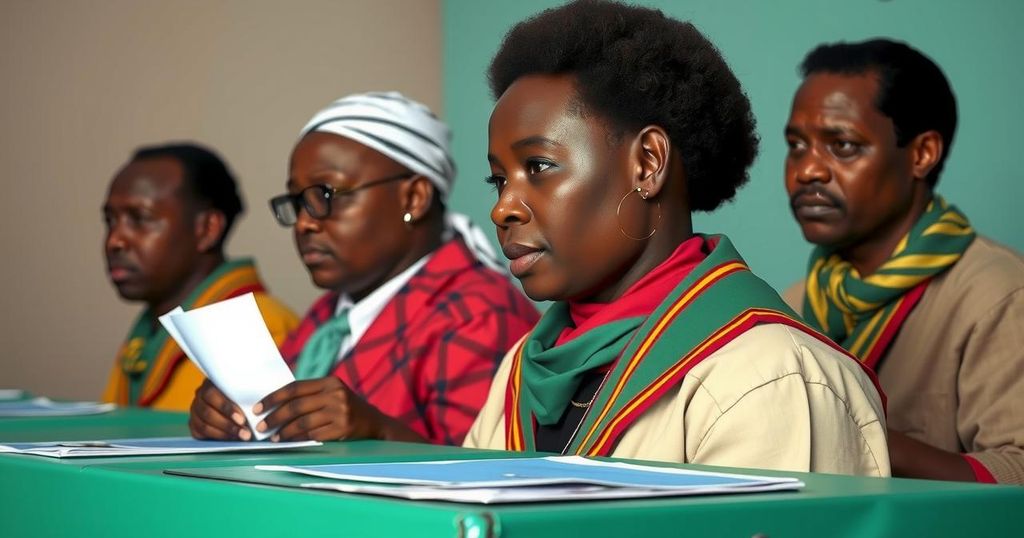World news
AFRICA, AL JAZEERA, BAWUMIA, CDD, CDD - GHANA, DEMOCRACY, ELECTION, GHANA, GHANA CENTER FOR DEMOCRATIC DEVELOPMENT, GOVERNMENT, JOHN DRAMANI MAHAMA, KAI, MAHAMUDU BAWUMIA, MAURITIUS, NAMIBIA, NATIONAL DEMOCRATIC CONGRESS, NDC, NEW PATRIOTIC PARTY, NPP, OPPOSITION, POLITICS, SOUTH AFRICA
Michael Grant
0 Comments
Shifting Dynamics of Power: African Voters Reject Ruling Parties
Recent elections in Africa have seen significant power transfers from ruling parties to opposition groups, with a major focus on public dissatisfaction with economic issues and corruption. Ghana’s election marked a notable victory for former President John Dramani Mahama over the ruling NPP. Similar trends were observed in Botswana and South Africa, where opposition parties gained ground amidst calls for better governance, particularly from young voters disillusioned with traditional political entities.
A remarkable political shift is occurring across Africa as voters in several countries are decisively ousting ruling parties in favor of opposition candidates. In Ghana, jubilant celebrations erupted in Accra following former President John Dramani Mahama’s victory over the ruling New Patriotic Party’s candidate, Mahamudu Bawumia, in a landslide election. This clear win, marked by an unprecedented gap of 1.6 million votes, reflects broader voter sentiment across the continent. Economic disillusionment, growing corruption, and ineffectual governance are driving shifts in electorates, particularly among the youth, who increasingly reject long-standing political parties.
In several general elections this year, notable power shifts were registered in countries such as Botswana, Mauritius, and Senegal, with opposition parties gaining substantial ground. Experts attribute these outcomes to widespread dissatisfaction with ruling parties’ handling of economic stagnation and corruption. The ANC in South Africa, for instance, faced its first major electoral loss in 30 years due to a combination of economic frustrations and internal strife.
Young voters are playing an influential role in this political awakening. In Southern Africa, liberation parties, once heralded as champions of democracy, are losing appeal among younger generations who do not share the historical nostalgia tied to these movements. Recent elections reflect this trend, with Botswana’s ruling party suffering historic defeats and new opposition figures emerging in South Africa and Namibia, challenging the status quo.
The changing political landscape encompasses deep-rooted issues such as unemployment, inflation, and widespread corruption linked to government responses—or lack thereof—during the COVID-19 pandemic. Youth-led protests have erupted in countries like Mozambique and Senegal, highlighting the growing demand for accountability.
Experts note that the opposition’s successful campaigns signal a maturation of democratic institutions across Africa, as citizens are increasingly voting beyond ethnic or religious affiliations. The resounding electoral defeats of ruling parties, coupled with the electorate’s rising consciousness, underscore a demand for improved governance and transparency. As electoral cycles continue in various countries, these shifts may represent an outlook towards further democratic advances.
The article discusses the recent electoral outcomes in several African countries, highlighting a trend where voters are increasingly rejecting ruling parties. This shift is particularly notable in Ghana, Botswana, South Africa, and Senegal, where significant opposition party gains have mirrored widespread public discontent with economic mismanagement and corruption. Experts emphasize that young voters, disillusioned with established parties, have played a pivotal role in shaping these electoral results. The sentiments expressed reflect a deeper desire for accountability and a call for more effective governance in the region, indicating a possible shift in the political landscape of Africa.
The electoral upheaval across Africa demonstrates a significant political evolution where citizens actively seek change from long-standing ruling parties. With economic difficulties and corruption as central themes in the electorate’s grievances, the rise of opposition groups signals a rejection of the past and a yearning for a more accountable governance structure. As the continent navigates its democratic journey, the pivotal role of young voters and heightened civic engagement will likely continue to shape future elections throughout Africa, setting a precedent for governance that is responsive to the people’s needs.
Original Source: www.aljazeera.com




Post Comment